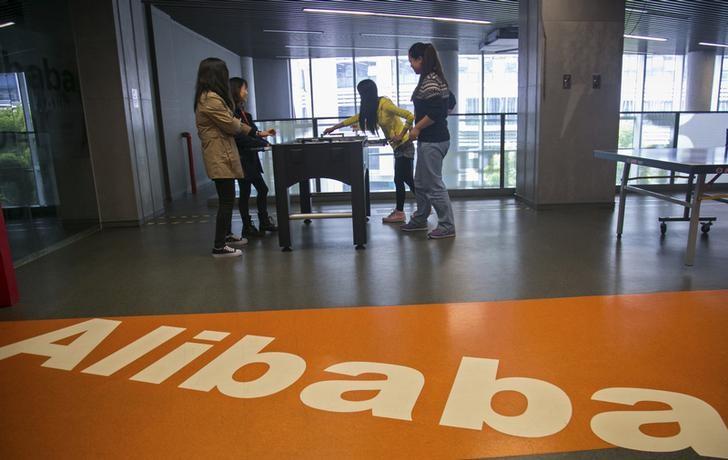NEW YORK (Reuters) – Alibaba Group Holding Ltd [IPO-BABA.N] seeks to raise more than $21 billion in an IPO that will value the Chinese e-commerce giant at up to $163 billion and rank as the largest-ever technology debut in the United States.

Alibaba expects to price its initial public offering between $60 and $66 per American Depository Share, valuing the company at about $162.69 billion at the top end of the range and raising a maximum of $21.1 billion.
The company founded by former English schoolteacher Jack Ma will decide on its final price after a globe-spanning roadshow that will kick off in New York on Monday, and is expected to stop in cities from Hong Kong to San Francisco.
If all goes well, Alibaba may ring the opening bell on the New York Stock Exchange in as little as two weeks.
Industry analysts had expected Alibaba to try for a valuation in excess of $200 billion, ranking the Chinese company among the 20 largest publicly traded companies in the United States. It may eventually price above the initial range, should it deem investor demand sufficient.
Many investors are eager to buy a piece of a Chinese company that handles more e-commerce than Amazon.com Inc and eBay combined.
“This number may seem enormous, but when you look at the value compared with the company’s fundamentals, it’s not as rich as we might expect,” said Brian Hamilton, chairman of private company analysis firm Sageworks.
CAUTION NOW
But some investors remain cautious about the potential conflicts of interest between Ma’s role as a steward of the company, and his investment interests elsewhere.
The company has also attracted its share of controversy in the past, as when it hived off lucrative payments unit Alipay, triggering objections from major shareholders Yahoo and Softbank.
The company said in its latest prospectus that it has racked up almost $16 million in IPO-related legal fees, unusually high for an IPO and an indication of the effort that Alibaba and its advisers have undertaken to prepare a complicated prospectus.
“When an Internet company of our scale that originated from China enters the global scene, you should expect that it will encounter skepticism from different directions due to differences in cultural perspectives, values and even geopolitical positioning,” Ma said in a letter to investors reminiscent of the “founder’s letters” that accompanied the debuts of Facebook and Google.
“While it may be difficult for a public Alibaba to side-step controversy, we hope that controversies generate constructive debate and add fresh perspectives to the dialogue on globalization.”
Some investors say the company’s fundamentals outweigh the risk of investing in a company with an unfamiliar governance structure.
Alibaba accounts for about 80 percent of all online retail sales in China, where rising Internet usage and an expanding middle-class helped the company generate gross merchandise volume of $296 billion in the 12 months ended June 30.
The Chinese e-commerce giant’s revenue accelerated in the April-to-June quarter on strong gains in its mobile business, providing investors with what may be the final glimpse of the company’s financials before its expected landmark market debut.
Revenue in the June quarter increased 46 percent year-on-year to $2.54 billion, a faster pace than the 38.7 percent growth in the previous quarter.
Alibaba is selling 123.1 million of the 320.1 million ADSs slated for the IPO. Shareholders including Yahoo, Ma and executive vice chairman Joe Tsai are offering the remainder.
CitiGroup has been appointed to the depositary receipt role for Alibaba, which means it will hold the underlying shares and issue ADRs to shareholders, according to a source familiar with the matter.
In other key banking roles, Morgan Stanley and Credit Suisse will manage the so-called “lockup” agreement that dictates when pre-IPO shareholders will be able to sell once the stock starts trading, a person familiar with the matter told Reuters. Goldman Sachs will act as the “stabilization agent,” overseeing the stock’s early trading.
Credit Suisse will also oversee the “friends and family program,” formally known as a directed share program, the person familiar with the matter said.
“Listen, it’s a very successful company. The market needs a company like this,” said Akram Yosri at 3i Capital Group. “As an institutional, I would have liked to see around $135 billion. It’s up to the syndicate now, I hope they exercise prudence.”








